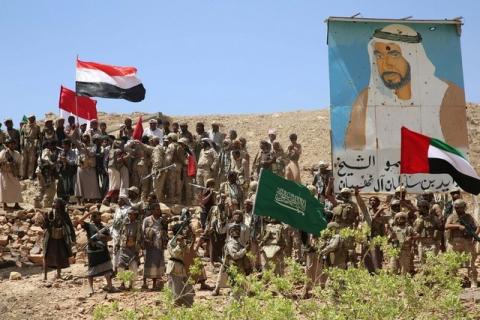Time running out to turn Yemen ceasefire into peace, says Hunt


Jeremy Hunt has warned of “a shortening window of opportunity” to save Yemen’s partial ceasefire in advance of talks in which Saudi Arabia and the United Arab Emirates will face pressure to not resume their military offensive.
The two countries are backing a UN-recognised Yemen government seeking to repel an Iranian-supported Houthi administration, and are frustrated that Houthi forces have not withdrawn from the vital port of Hodeidah.
Hunt said the talks, which are being held on the margins of a summit in Warsaw, would focus on a drive to inject money into Yemen’s central bank so tens of thousands of public sector workers, including those in Houthi-controlled areas, can be paid.
A lack of cash, a devaluation of the rial and food shortages have led to famine in parts of the country. The UN-backed government has not paid salaries in Houthi-controlled areas for up to three years.
Hunt said: “We now have a shortening window of opportunity to turn the ceasefire into a durable path to peace, and stop the world’s worst humanitarian crisis.
“Real progress has been made to reach a political solution but there are also real issues of trust between the two sides which mean the agreement in Stockholm has not been fully implemented.”
He said the famine was a human-made economic crisis, not a natural disaster, and practical steps such as resuming salary payments to civil servants could improve access to food for millions.
He added: “We are in an absolutely critical phase. If we had looked at the problem six months ago, people were very gloomy but to everyone’s surprise, we had a success in Stockholm and we can see now parties on both sides want to work their way through this.”
The US secretary of state, Mike Pompeo, who is under pressure from Congress to end support for the Saudi incursions into Yemen, will attend the talks.
In a meeting on Monday night, ambassadors from the US, UK, UAE and Saudi Arabia agreed to “stabilise the Yemeni rial and strengthen Yemen’s economy by consolidating revenues, paying all public salaries, and continuing to strengthen the Central Bank of Yemen”.
The prime minister, Maeen Abdulmalik Saeed, has promised the UN humanitarian coordinator for Yemen, Lise Grande, that he will pay the salaries of university and health workers in areas controlled by the Houthi group in northern governorates. Riyadh has injected more than $2.2bn (£1.7bn) into Yemen’s central bank to shore up the currency, but the issue of salaries has not been resolved. Progress on the economy, including a regular flow of cash into the bank, is seen by analysts as vital to building trust.
The four ambassadors condemned the Houthi rebels “illegal interference” in the operations of a number of banks in Sana’a and the arrests of banking staff, saying the actions posed a threat to civilians and the economy.
“The four nations firmly request lifting the imposed regulations on the local banks in Sana’a, which impede commercial imports and desperately needed humanitarian assistance”, they said in a statement.
Progress on the outline ceasefire agreements has been slow, and the Yemeni government has repeatedly demanded that the UN special envoy, Martin Griffiths, call out Houthi rebels for backtracking fon the commitments made at Stockholm.
Griffiths, who wishes to remain a neutral facilitator, has called for aid workers to be able to access grain that is at risk of rotting in mills. The grain is said to be enough to feed 3.7 million people for more than a month.
AFP.

Paris — The French humanitarian organization Acted announced that it has delivered cash assistance to nearly 89,000 people affected by displa…

Sana’a — Fuel and food imports into ports under the control of Yemen’s Houthi movement on the Red Sea have continued to fall for…

ADEN — Yemen Airways, the country’s national carrier, announced it will resume flights between Aden and Abu Dhabi beginning in January…